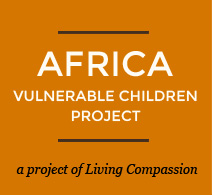Theresa reports she is feeling 100% this morning. We all suspect that what happened to her is that we've worn her out. We hit town and her schedule changes completely. She's driving all day, interpreting, organizing, arranging, and working full-time to keep track of the musungus.
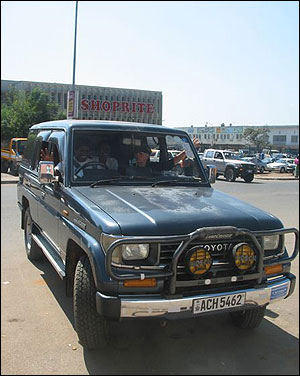
Theresa waving good-naturedly from her chauffer seat.
Still, we arranged for a later start time, choosing to stay "home," getting current with the blog and preparing it for hand-off to Godfrey. The blog is one of the aspects of these trips that we enjoy most--it's the only way we have a prayer of keeping track of what we're doing--and it is enormously time-consuming
Our days usually begin early, with yoga or walking/running and meditation, breakfast, and a 9:00 a.m. departure for meetings and appointments. On most days we return home just in time to fix something to eat, make a plan for the next day, and collapse. None of us can figure out exactly what makes these days so tiring. Yes, they're long days, but we're used to long days at home. It would be easy to identify the heat as the culprit--several hours of baking sun can take it out of a person--but we suspect it's more the non-stop intensity that leaves us close to spent at the end of the day. So, a week into the trip, it seemed a good time to slow down the pace a bit and to get caught up and organized for our final push to complete our to-do list.
Mr. Kayula came by with the samples of the monk bags. These bags are a little larger than the old ones and are lined with the same kind of patchwork chitenge that makes up the outside. Rather than continuing to work with Martin, we have decided to take these out to the Kantolomba women and see how they do at producing them. Which is actually not true. We just need to give them the pattern and tell them how many we want; we know they will do a great job, they've proved that over and over again. We will miss Martin but have realized that working with him is very difficult--he lives far away and speaks no English--and our commitment is to having all our projects in Kantolomba.
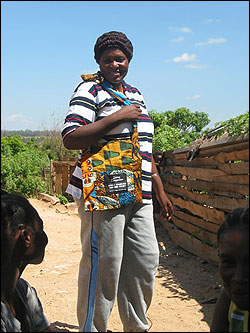
Theresa modeling the latest monk bag.
We took this opportunity to clarify with Mr. Kayula his future role with Living Compassion. Much of the legal work has been completed and he is now on retainer, charged with keeping us informed about changes in government procedures that might affect us.
Bruce, our friend from the U.S., and Greg, our new friend from South Africa, arrived about noon. They had been driving in from the hinterlands since early that morning, and were very ready to be out of a car and have some lunch. C'est Bon. Over a leisurely yet rather bizarre meal--many jokes about the "secret" sauce on Bruce's and Greg's burgers--we got caught up on the latest in the worlds of micro-finance and housing in developing nations.
After lunch, while Cheri, Jen, Theresa, and our two guests headed for Kantolomba, Dave stayed in town to collect the results from the water test and, hopefully, to get the drillers working again.
The day before, Mr. Chaila, the head of the water department, had agreed to delay completion of the project while we got the water tested. If the water turned out to be contaminated, this would give us the option of paying the drillers extra to dig a deeper well and to seal out the source of the contamination.
We had expected to receive the results from the test in the morning. This would have constituted a delay of only one afternoon. When we called Bobby, the technician at the Tropical Diseases Research Center where the test would be done, he said he could not get the results to us before thirteen hours. Disappointed but not discouraged, we phoned Mr. Chaila to tell him we would need a few more hours. Mr. Chaila was obviously anxious to get going again, but agreed to wait a little longer. At twelve, we called Bobby to confirm that the results would be there within the hour. He said it had not been done and could not be done before fifteen hours. Mr. Chaila was gracious when he heard the news, but he made it clear that something had to be done. There is only one government drilling rig in this part of the country, he said, and it is needed desperately in other places. We suddenly found ourselves in a difficult place: we needed the results of the test in order to proceed, and Mr. Chaila needed his rig.
It was right at this point that we finished lunch at C'est Bon. While the others rolled off towards Kantolomba, Dave grabbed a taxi and dashed to the hospital to see if he could make something happen. He jogged up to the seventh floor (none of us trust the elevators in that ancient building), persuaded the security guard there to let him into the lab, found Bobby, and begged him to speed things up. As it turned out, Bobby had done a little pleading of his own on our behalf and had just received the results of the test. "There is no bacteria," he said. "The water is good."
Elated, Dave phoned to tell us. We were still driving towards Kantolomba. When we heard the news we all cheered, even Bruce and Greg. Next, Dave called Mr. Chaila to give him the go-ahead. He seemed pleased also, and excited for us and our success. Immediately he called his drillers and told them to fire up the rig and get to work.
Finally, we finished the long drive out to Kantolomba with the fellows. It becomes obvious how accustomed we are to that trek when we see it through the eyes of first-timers. Is this it? So, it's beyond this? It feels like miles out across a truly disastrous road comprised of potholes held together with a little dirt.
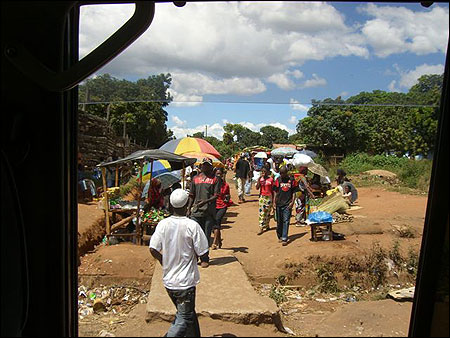
On the road to Kantolomba
As we reached the edge of the compound the chanting began: Amusungu, amusungu. The white people have arrived. The little ones are dancing around, waving, and mugging for us. As we drove along, we pointed out the collapsed houses--approximately 125 during this rainy season alone--the deplorable water situation, our cute little school, and finally arrived at our project. There was the tidy wooden fence and the enormous well rig towering above the future kitchen building.
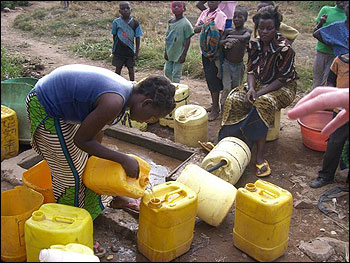
People gathered to collect the only water currently available in the compound.
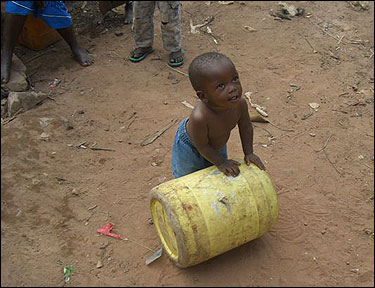
A tiny helper rolling a water jug along.
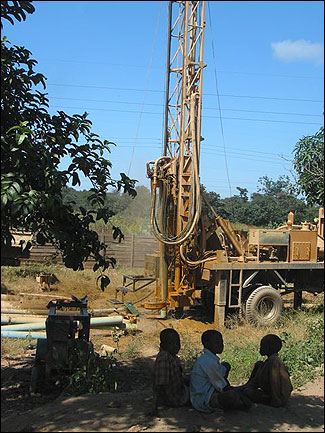
The rig waiting to finish the job.
These were our first visitors, and it was very encouraging to see and hear their reactions to our efforts. They were truly touched--happy for us and for the folks in Kantolomba. As we were preparing to leave, we heard the sound of singing and, looking down toward the corner of the property, we could just see the tops of the heads of the women we now know are the Kantolomba 12. No words can communicate the sight and sound of those women movin' and groovin' along the path. At least one had the ax she'd been using balanced on her head. They sang harmony, calling and responding, clapping and dancing. They had heard that the water was clean, and they were singing their joy and gratitude. The theme was something along the lines of, "You told us there would be something here, and now your work can really be seen." They would sing a stanza in Bemba and dedicate it to each of us, calling out our names in turn.
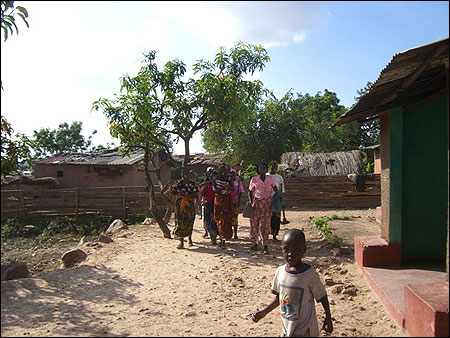
The Kantolomba 12 appearing up the path.
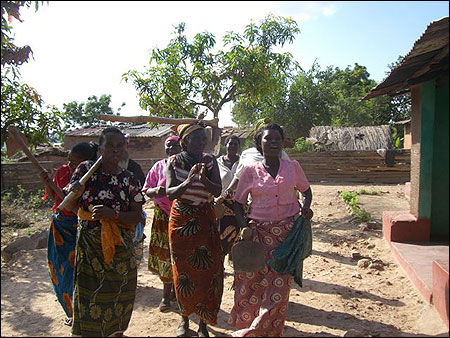
Singing their gratitude.
We drove the fellows to the airport--it had been a short but wonderful visit--and headed back to the Guest House to meet with Gaudencia, her husband Wom, and Israel, the electrician. Gaudencia's bid is right in keeping with what Steve, from the building department, had estimated. It's their tradition that if a bid is 20% too high or too low (meaning 20% higher or lower than the building department estimate), the bid cannot be accepted. Handshaking all around as we hired Gaudencia as our contractor.
Too tired to go on, we had the equivalent of a light snack and collapsed.
